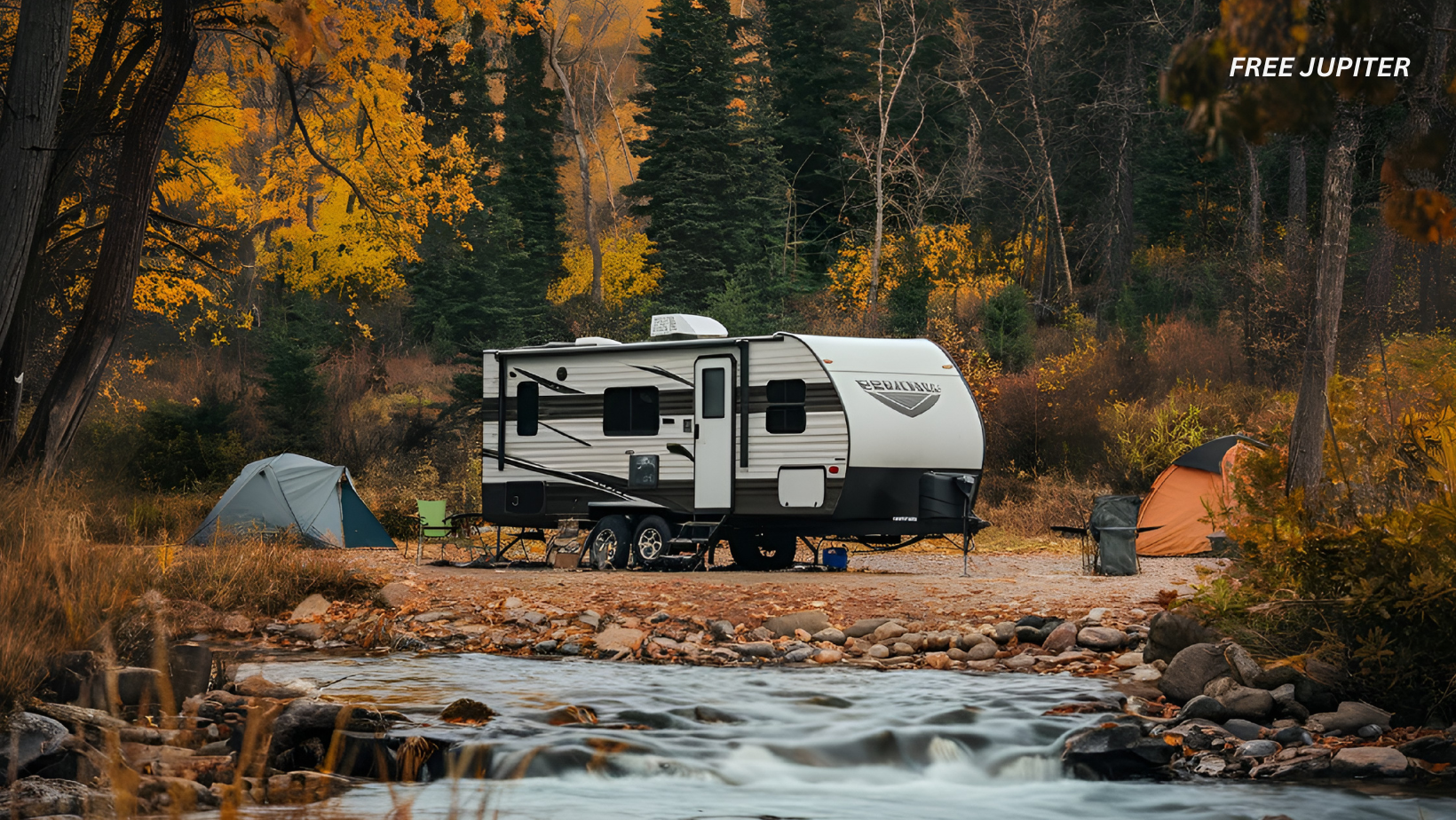Friendly Note: FreeJupiter.com shares general info for curious minds 🌟 Please fact-check all claims—and always check health matters with a professional 💙
Once upon a time, the so-called American Dream meant buying a big house, settling down in the suburbs, and mowing the lawn on Saturdays. These days, that dream has gotten a bit of a remix. With housing prices climbing like a cat up a curtain and debt weighing down on younger generations like an overpacked backpack, more and more people are redefining what “home” really means.
Enter the humble RV—Recreational Vehicle, mobile home on wheels, and, for a growing number of folks, a ticket to freedom.
The appeal is obvious: No massive mortgage. No rigid lease. No nosy neighbors peeking over the fence. Just you, the open road, and the ability to move your whole life with the twist of an ignition key. Whether you’re a digital nomad working from national parks, a retiree chasing sunshine, or just someone fed up with city life, RV living sounds like a dream come true.
But here’s the twist: In many parts of the United States, living in your RV full-time on your own land is technically illegal.
Yes—even if you own the RV and even if you own the land it’s parked on.
🏡 Why Can’t I Just Live in My RV on My Property?
Great question. At first glance, it seems like a no-brainer. It’s your property, after all. Shouldn’t you be allowed to park your RV there and call it home?
Unfortunately, the law doesn’t always work that way.
The main issue isn’t ownership—it’s zoning.
Zoning laws are the local rules that govern what kind of buildings are allowed in different areas. Some places are zoned for residential homes, others for businesses, farms, or industrial facilities. These laws also regulate what counts as a legal, habitable dwelling.
In most places, an RV simply doesn’t qualify.
Even if your RV has a comfy bed, working kitchen, solar panels, and the world’s fanciest composting toilet, many local governments still don’t consider it a “permanent residence.”
Here are a few common roadblocks:
- Utility Requirements: Many cities and counties require homes to be connected to public utilities like water, sewage, and electricity. An off-grid RV setup often doesn’t meet these requirements.
- Health & Safety Codes: Some areas have rules about minimum square footage, septic systems, or types of construction materials used.
- Temporary vs. Permanent: RVs are typically considered temporary vehicles, not permanent homes. That makes a big legal difference.
🚫 States That Don’t Allow You to Live in Your RV Full-Time
There’s no nationwide ban on RV living—but that doesn’t mean it’s easy.
Some states have put their foot down entirely, making it essentially illegal to live full-time in an RV on private land. These include:
- Hawaii
- Indiana
- Michigan
- Delaware
If you’re dreaming of RV life in one of these states, you’re likely to hit legal snags unless you’re parked in an official RV park or campground with time limits.
Even outside of those states, many counties and cities have their own strict rules. What’s allowed in one town might be totally banned a few miles away.
This patchwork of regulations makes things tricky. You might legally buy an RV and legally buy land—only to discover you can’t live in one on the other.
Read more: The 3-10s Rule Helps Emotionally Intelligent People Navigate Stressful Moments Wisely
💡 Creative Workarounds for Determined RV Dwellers
But RV folks are a resourceful bunch. Where there are rules, there are usually loopholes—or at least some clever detours.
1. The Shuffle Strategy
One workaround involves moving the RV every so often to avoid violating “length of stay” laws. This might mean switching between campsites or even rotating spots on your own land. It’s a bit of a hassle—but it can keep you technically legal.
2. The Hybrid Set-Up
Another method is building a structure around or beside the RV. This could be a pole barn, carport, garage, or even a tiny home that encloses the RV entirely. In some cases, local officials will consider the setup a “permanent dwelling” if it meets building codes.
Some people even install RV hookups on a property that already has a legal residence, allowing them to live in the RV while staying within the law.
3. Join a Collective
In rural areas especially, groups of like-minded people are buying land together and creating private RV communities. These may be registered as campgrounds, tiny house villages, or co-ops. In some cases, they’ll apply for an official RV park permit and essentially become their own landlords.
🟢 States Where RV Living Is Easier (and Sometimes Even Encouraged)
Looking for a state that embraces the RV lifestyle with open arms? Here are some of the friendliest:
- Texas
- Florida
- Arizona
- Oregon
- Colorado
These states tend to have more relaxed rules, fewer zoning headaches, and a live-and-let-live attitude—especially in rural areas. You’ll still need to double-check county-level regulations, but in general, these states offer the smoothest path to full-time RV living on your own land.
Pro tip: Look for land zoned as “agricultural” or “rural residential.” These tend to be the most flexible when it comes to alternative living setups.
Read more: If These Everyday Situations Don’t Bother You, You Were Clearly Raised Right
🛠 Things to Keep in Mind Before Committing to RV Life
If you’re seriously considering full-time RV living, here’s a quick checklist to avoid legal trouble:
✅ Research Local Zoning Laws: Start with the county. Some counties have online zoning maps. If not, call the local planning office and ask what’s allowed on the land you’re eyeing.
✅ Ask About Sewage & Waste Rules: Even in lax areas, local officials care deeply about sanitation. Make sure your setup meets their requirements.
✅ Keep It Tidy: A well-maintained RV setup is less likely to attract complaints from neighbors (and the zoning inspector).
✅ Consider Permitting Options: Some counties allow RV living with a temporary use permit or if the RV is an accessory to a main residence.
✅ Watch for Changing Laws: This area of law is in flux. As more people turn to RVs and tiny homes, local governments are starting to re-examine outdated zoning codes.
🧭 Why RV Living Isn’t Just a Trend—It’s a Movement
Sure, some people might see RV living as a fringe lifestyle—but for many, it’s a choice born from practicality, financial necessity, or even philosophy.
The traditional housing market has failed a growing number of Americans. Between sky-high prices, endless red tape, and rigid expectations, people are looking for new ways to define what “home” means.
And let’s be honest—there’s something deeply satisfying about waking up to a mountain view, sipping coffee with the sunrise, and knowing your home can follow you wherever the road leads.
Lawmakers are slowly catching up. In fact, more states are starting to consider bills that would expand the definition of legal dwellings. That means we might be heading into a future where RVs, tiny homes, and other creative housing options finally get the respect—and legality—they deserve.
Read more: Quiet Habits of a Woman Who’s Learned to Rely Only on Herself
🚀 Final Thoughts: Freedom, With a Few Conditions
Living in an RV on your own land isn’t as easy as just pulling in and popping out the awning—but it’s far from impossible.
With some research, a little creativity, and a willingness to jump through a few bureaucratic hoops, you can still chase the dream of minimalism, mobility, and independence.
So if you’re itching to trade your four walls for four wheels and a million new views, don’t let the red tape hold you back. Just make sure you know the rules, bend where you can, and roll on with confidence.










